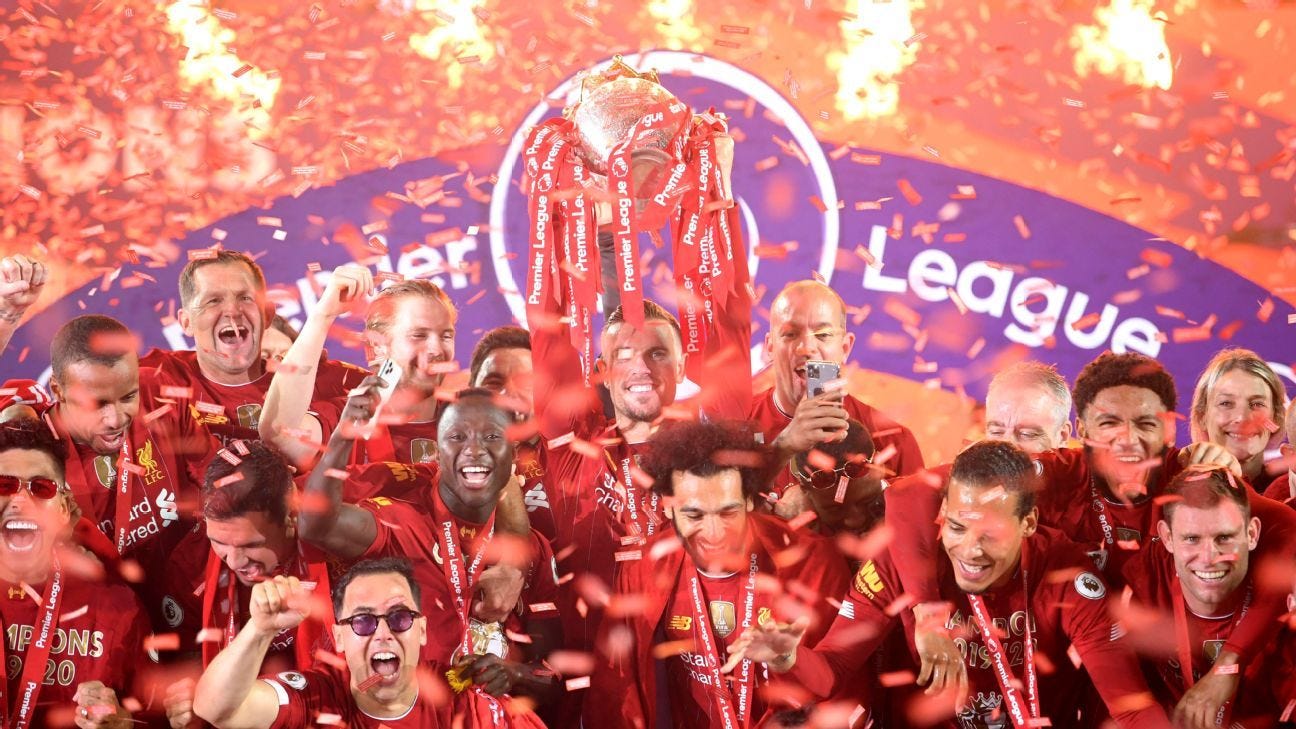 |
Black lives matter. This document has an exhaustive list of places you can donate. It’s also got an incredible library of black literature and anti-racist texts. Donate, read, call, and email your representatives. We’re all in this together.
A couple days ago, a friend of mine -- a savvy sportsfan who covers the NFL for a living -- asked me for “recommendations on something I can watch/read/listen to that explains ... everything”. He didn’t mean everythingabout everything; otherwise I would’ve obviously sent him used copies of these two books:
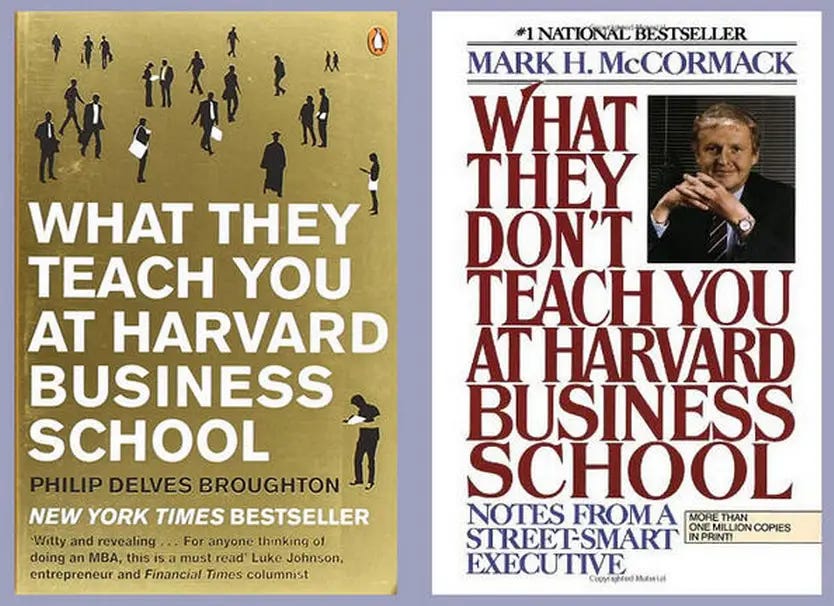 |
No, he’d just finished watching the show Ted Lasso, had always been interested in the Premier League, and combined with the monotony of quarantine, that all spurred him to start following the league and the sport a little more closely. In other words, he wanted to read something that covered this situation: “like if an alien (me) wanted to know the deal with the Premier League”. I figured he wasn’t alone. People ask me if I’ve watched Ted Lasso every couple hours at this point, plus if there’s a time to get into soccer it’s the time when we’re all still mostly sitting around at home, all the time. But I didn’t have a good place to direct him. There’s plenty of whip-smart soccer writing and videos and podcasts and documentaries out there, but nothing that really provides an entry-level framework for watching the Premier League on a weekly basis. So, here is my attempt to rectify that: a short conversation with myself about how the Premier League works.
So, uh, how does it work?
It’s pretty simple, actually. The league has 20 teams (although that could change with news of a proposal from over the weekend that would, among other things, contract the league down to 18 teams, but we’re not gonna worry about that for today). They each play each other twice: once home, and once away. A win is worth three points, a draw is worth one. Everyone has the same schedule, and once that schedule is completed, the team with the most points is given a trophy.
That’s ... it?
Well, no. While the beauty of soccer itself and the season-style that game spawned lies in its structural simplicity, the worldwide soccer system is a billion-dollar bureaucracy. And like any good global bureaucracy, the product it produces is a massive clusterfuck. In England, teams also play in the Carabao Cup and the FA Cup. And if they’re good enough or they perform well enough in the Carabao or FA Cups the previous year, they’ll also play in one of two continental competitions: the Champions League or the Europa League. And if they do well enough in either of those, they’ll also play in the Super Cup and potentially the Club World Cup. Oh, and the Community Shield, too.
Uh ...
That’s not all! Most teams in the Premier League are rich enough to employ players who are good enough to get called up to their national teams, too. Throughout the season, there are a number of international “breaks” mandated by FIFA, the sport’s global governing body. That word in the previous sentence is encased in quotations because they’re not really breaks from play. No, at various points throughout the season, the Premier League -- and other European leagues -- will pause play for two weeks as players fly across the world to compete in qualifying and exhibition matches for whatever countries they represent. The games continue, just with different uniforms.
Even now, during a pandemic?
Yes, literally right now, in fact. Domestic play paused two weekends ago, and it starts back up again this weekend. Unsurprisingly, something like this has already happened:
This is the opposite of a bubble.
I’m already confused.
That’s the point. As a new fan, I’m not really sure it’s even worth it to try to understand all of this. The FA and Carabao Cups are playoff-style tournaments that English teams of varying levels compete in during the Premier League season. They’re versions of that in-season tournament the NBA has been mulling over for a few years now. Everyone in the Premier League gets to be in both competitions, but it’s often unclear how seriously each team takes each tournament, and a lot of clubs use the cups as opportunities to give playing time to guys who typically don’t see the field much in the competitions they actually always care about. The winners are typically produced by some algorithm of capitalizing on well-timed apathy. Premier League teams care about how they perform in the Premier League and how they perform in Europe. That’s where the money is, and where the most competitive games are, so that’s where you should keep focus, too.
Tell me more about the money.
There’s a reason the Premier League is the easiest one to watch in the United States and why Ted Lasso isn’t a show about a defensive-line coach who ended up managing in Marseille. The Premier League is the richest league in the world -- by far. Its domestic TV deal pays out at a rate of £8.75 million per game. Next highest is the German Bundesliga, which gets £3.36 million per match -- or less than half of what EPL games garner. Every year, the accounting firm Deloitte publishes a report about the 30 richest teams in world soccer, called the “Deloitte Football Money League”. In the most recent edition, six of the 12 richest teams in the world were from England, as were 11 of the top 30.
Is there a salary cap?
Eh, yes and no. European soccer’s governing body, UEFA, created “Financial Fair Play” last decade. It was designed to prevent rich owners from buying clubs, injecting them with debt, and then skipping town once they realized how hard it is to build a good soccer team. So, FFP essentially tells teams that they can’t spend more than they make.
But doesn’t that favor the teams that were already making a lot of money?
Ding, ding, ding. The added bonus of FFP -- and likely why it was passed in such a form -- is that it benefited the most powerful group: Europe’s traditionally big clubs.
Are the richest Premier League teams just the best Premier League teams, then?
Broadly, yes. For all the randomness of a low-scoring game and all of the work that has gone into building up new knowledge of the sport through soccer’s nascent analytics movement, the best predictor of results is how much a team pays its players. From research by the economist Stefan Szymanski:
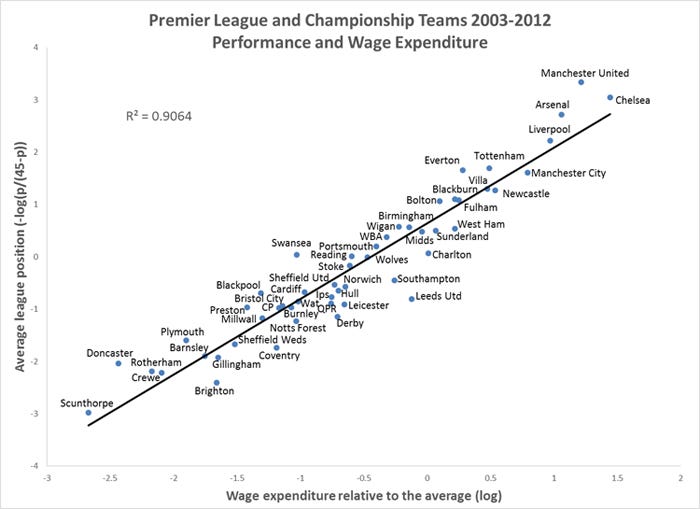 |
However, Manchester United have been the richest English team in every year of the past decade, but they also haven’t won a title -- or even come close to winning a title -- since 2013. However, all of the winners since then were in the top 10 of the Deloitte Money League rankings for the year of their winning. Except for Leicester City, who were a 5,000-to-1 longshot to win the Premier League the same year they did so.
Manchester United sound kind of like the Yankees.
Pretty much! They even used to air United games on the Yankees-owned YES Network. Tease a Yankee fan for long enough and they’ll involuntarily spit out the number “27”. While Manchester United haven’t won since 2013, they still have the most English titles of any club: 20, one more than defending champs Liverpool. Manchester United used to be managed by arguably the greatest coach of all time: Sir Alex Ferguson. Fergie won 13 Premier League titles while with United, in addition to two Champions League trophies. He was a master of adaptation, constantly adjusting his teams on the fly, never afraid to try out a new tactical approach or to cut ties with a beloved club legend as soon as he sniffed out any sign of decline. Unlike other coaches, he’s not associated with a specific philosophy of how to play the game; he’s really just associated with winning.
However, Ferguson was one of soccer’s last managers, a coach who seemingly controlled the operations of the club from top to bottom. The closest thing in American sports is probably Bill Belichick, but SAF wielded even more power than he does. Ferguson won the title in his last year with United, and the club’s average final-table position since then is a paltry fifth. They weren’t just replacing a coach, it turns out. They were essentially replacing the entire backbone of the club.
How much does your finishing position matter? “If you’re not first, you’re last” kind of thing?
It matters a ton. The higher your finish in the table, the more money you earn. But more important than that, the top four teams in the league every year qualify for the following season’s Champions League, a round-robin tournament between the best teams in Europe. (Champions League games take place during the week throughout the season, while most PL games occur on the weekend.) Every club wants to win the Champions League, but for most teams, CL competition is more important for all the added revenue it brings. Qualification itself is worth around $18 million, and the further you progress in the tournament, the more money you make. And the more money you make, the more likely you are to qualify for the Champions League the following season, and on and on and on. Some managers get mocked for only winning “Top Four Trophies”, but finishing fourth is harder to do and way more valuable than winning the FA Cup or Carabao Cup.
At the other end of the table, the bottom three teams get relegated from the Premier League and they go down into the second-division or the Championship. The top-three teams -- well, top two, plus a winner of a playoff we won’t go into detail about -- from the Championship then come up and take their spots. Relegated sides are given “parachute payments” to help ease the financial blow as they lose out on all the millions of the TV deal but still have a roster of players on Premier League-size contracts. Still, the financial impact of promotion and relegation is massive.
OK, so who has filled the Manchester United-shaped void?
A couple teams. Chelsea have two titles since 2013, and Manchester City have three.
Chelsea are owned by Roma Abramovich, a Russian oligarch who is pals with Vlad Putin and owns the world’s largest yacht. Here’s an example of why that helps win soccer games: The way teams tend to acquire players in soccer is through a transfer. They pay a fee to the player’s club to get the player out of his contract, and then they sign the player to a new contract. All parties have to agree to this; a player can’t be transferred if he doesn’t want to leave. Rarely do elite players ever reach soccer’s version of free agency, even though it would presumably benefit them financially. Anyway, due to the lack of games in front of fans and the, uh, larger contraction of the global economy, most teams didn’t have the liquid cash needed to acquire a lot of new players this offseason. Abramovich, however, pretty much always has a ton of liquid cash. Chelsea’s net transfer spend this summer -- purchases minus sales -- was $188.32-million, over $70 million more than the next spendy-est side.
Then there’s Manchester City, who are essentially owned by the Abu Dhabi royal family and have run afoul of FFP rules -- but not been punished too harshly for doing so -- multiple times over the last decade. They’ve spent more money on players than any other club since new ownership took over, and combined with relative talent-spotting competence and savvy long-term planning (a rare trait among soccer clubs), that has produced three titles since 2013, including a league-record 100 points in 2017-18.
In addition to Leicester’s title, there’s also defending champions Liverpool, who finished last season with 99 points after nabbing 97 points the year before as they finished second to City’s 98. They also won the Champions League in 2019 and were in the final the year before. It’s too easy of a comparison, but it’s the right one: they’re soccer’s Red Sox. The same guy, John Henry, owns both teams. And although Liverpool have 19 titles -- and six European trophies -- they hadn’t technically won a Premier League title until last year. (The league was rebranded as the “Premier League” in the early 90’s.) Much like Boston, Liverpool were a historic franchise with a barren recent history. And much like Boston, Henry’s ownership saw the team embrace analytical and objective thinking to acquire the best players to help them end their championship drought. For the past 15 years, Liverpool were always sort of scraping at the Manchester clubs and Chelsea, occasionally finishing ahead of one or two of them but it never felt like they had the financial power to mount a long-term challenge. However, with the team’s sustained success over the past few seasons, at home and abroad, they’ve built up their revenue to a new level that, combined with one of the best front offices in the sport, should see them compete for trophies for a long time.
It’s Manchester City, Liverpool, or Chelsea for the title this season?
That’s certainly the projected three by the people who best know these things, i.e. the betting markets. But really, despite some early season struggles for both sides, it’s likely just a two-team race between City and Liverpool -- just like it’s been for the past two seasons. Over the previous two years, the average point gap between second and third was 20 points.
Not only do they have world-class talent. City and Liverpool are coached by the two best managers of the current era: Pep Guardiola and Jurgen Klopp. The cliff’s-notes tactical history: Guardiola employed a revolutionary possession-based approach that conquered the more conservative, structured defense-first styles that ruled the early part of the century. He won every trophy imaginable with Barcelona and totally dominated Germany while with Bayern Munich. He helped reassert Bayerns control of Germany, after it was wrested away by Klopp and Borussia Dortmund. Klopp’s style was called “heavy-metal football” and it was characterized by “gegenpressing”, when his teams would attempt to win the ball back high up the field as soon as they lost it, rather than dropping back and protecting their own goal. Klopp’s style can also be looked at as a response to Pep’s, a way to disrupt teams that want to pass the ball. However, over time, they both seemed to have aped aspect’s of each other’s teams: City press aggressively and Klopp’s Liverpool can dominate possession with the best of them.
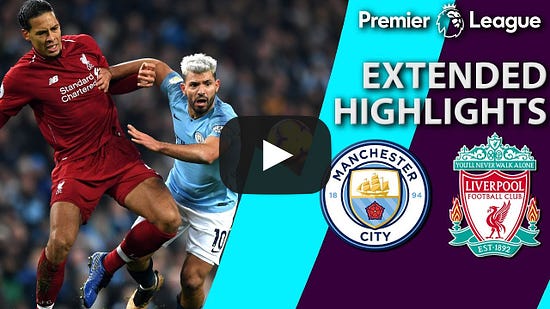
Per the site ClubElo, Guardiola is the highest-rated manager in the history of the sport, while Klopp sits in fourth. The four highest point totals in league history are two Liverpool and two City seasons since 2017-18. The Premier League might not ever again see two teams hit the same levels, at the same time, that City and Liverpool have reached over the past few years.
OK, and how ‘bout that whole “Fourth-Place Trophy” thing?
From a financial perspective, it should be a battle between Chelsea (fourth-place last season), United (third), Tottenham, and Arsenal; they’re those six teams in the top 12 of the rankings mentioned earlier. Arsenal’s revenue was sixth-highest in England last season, but it was also double that of the seventh-richest team, West Ham United. However, much like United after Ferguson, Arsenal have really struggled since the departure of their own capital-m manager Arsene Wenger, who coached the club to the only undefeated season in league history back in 2004. United have continued to not properly press their financial advantage, and they only have three points from three matches and a minus-six goal differential. Perhaps because the gap to City and Liverpool is so large, Arsenal, Chelsea, and Manchester United are all coached by inexperienced former players, none of whom have a track record of making their teams better than the sum of their parts. They’re not necessarily the guys you’d want if you were pushing for immediate results. Tottenham, meanwhile, are managed by Jose Mourinho, who won just about every trophy there is at the beginning of the previous decade, but has been fired midseason at each of his last two jobs: Manchester United and Chelsea.
Last year, Leicester, who used the revenue from winning the league and qualifying for the CL back in 2016 to completely rebuild their title-winning team, finished ahead of Tottenham in fifth, while Wolverhampton, a team that benefits from strong connections with Portuguese super-agent Jorge Mendes, finished ahead of Arsenal in seventh. And then there’s Everton, the other club in Liverpool. While some of the richest sides are experimenting with previous players on the sideline, Everton went out and hired Carlo Ancelotti, who’s won the Champions League as a manager with both AC Milan and Real Madrid. They also acquired James Rodriguez, World Cup superstar, over the summer. They’ve won every game so far and play Liverpool this weekend. All of these teams have a shot at top four, to varying degrees.
OK. And what players should we keep an eye on?
At Liverpool, they have probably the best attacking trio in the world, led by the Egyptian wide forward Mohamed Salah, who’s currently doing his best Lionel Messi impersonation, as he’s been the fulcrum of every aspect of Liverpool’s attack through four games. His stuttery style, combined with core-of-the-Earth-level balance and strength, demands your attention. Liverpool also just acquired Thiago from Bayern Munich, and he’s one of the few midfielders in the world that even a novice-watcher will obviously and immediately understand to be awesome. There’s right-back Trent Alexander-Arnold, a lanky 22-year-old kid who is technically a defender but creates chances like a top-tier attacker. And then Virgil Van Dijk, the towering, always-in-control, be-everywhere-at-once center back who will make you feel like you’re wearing a weighted blanket whenever you watch a Liverpool match.
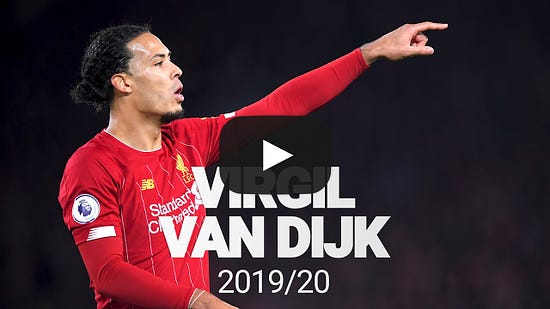
At City, the stars of the show are Kevin De Bruyne and Raheem Sterling. KDB is the best attacking passer in the world other than Messi. The pace-plus-precision he puts on the ball is unmatched and, frankly, hard to comprehend as physically possible. Sterling, meanwhile, is only 25 but he’s already easily the best English player of his generation. He’s just always on the ball in incredibly dangerous positions; that’s not luck, it’s all skill. My favorite thing about Sterling is how his game changes based on the players around him; if City needs more scoring, he’ll do it. Need him to break down a defense on the dribble? OK. Does someone need to take over creative duties from KDB? He’s your man.
Chelsea signed perhaps the two best young German soccer players in the world over the summer in Timo Werner, an impossibly fast and direct striker, and Kai Havertz, who looks like a Twilight character and glides across the field like he’s not even trying. They also added Hakim Ziyech, who I once called the “JR Smith of Soccer”, which was obviously meant as an extreme compliment, to play on the wing. Add in Christian Pulisic, Captain American and probably the Premier League’s best player over the final two months of last season, and this attack could get real special, real soon -- that is, once Pulisic and Ziyech fully recover from a couple of injuries.
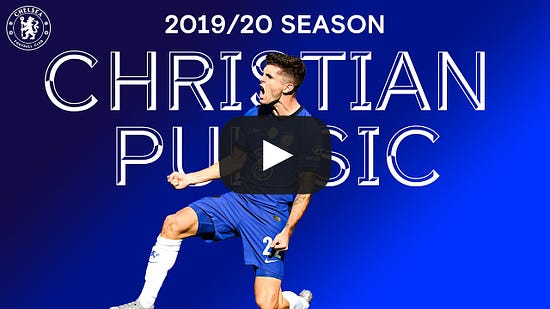
We can keep going for a long time. Although he’s struggled this season, Manchester United’s Paul Pogba is still one of my favorite players to watch; he plays with an unmatched level of grace that drives commentators insane. United also have the People’s Champ, Marcus Rashford, who has done more for working people than 99-percent of elected officials in the U.K. and the U.S. Oh yeah, he’s only 22 and he’s pretty good at the soccer thing, too. At Tottenham, Harry Kane has transformed himself from what seemed like a generational goal-scorer to one the, uh, great creative players in the league? They’re also welcoming back club legend Gareth Bale from Real Madrid, and although he hasn’t performed well in a couple years and came to the club injured, he’s absolutely electric when he puts it all together. At Everton, James is brilliant, but so are Dominc Calvert-Lewin and Richarlison -- a pair of physical, direct, and increasingly effective attacking players who buck the trend toward smaller final-third talents. Leicester still employ Jamie Vardy, who might be better at drawing penalties than anyone in the Premier League is at any other facet of the game. And, of course, Wolverhampton have our patron saint, Adama Traore, the one-man dribbling machine who literally covers himself in oil before matches so defenders can’t grab him. He’s the size of Saquon Barkley, but claims he’s never lifted a weight in his life.
The list shouldn’t end there. Want to understand what a great attacker can do other than scoring goals? Watch Aston Villa’s Jack Grealsish; he’ll be the guy who looks like he has a two-liter orange soda tucked into his socks. But this is already getting long enough for an intro post. Money gets players who win games. The Premier League’s financial advantage has been building and building over the years, and top to bottom, it really seems like the league has more talent than ever before. Use this guide, sure, but you can really turn on just about any Premier League game this season, and you’ll probably be entertained.

